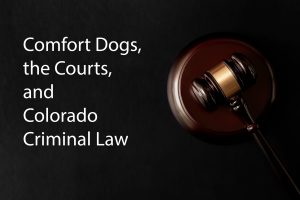Comfort Dogs, the Courts, and Colorado Criminal Law

By H. Michael Steinberg Colorado Criminal Defense Lawyer
An Introduction to Comfort Dogs
Many criminal defense lawyers view “comfort dogs,” specially trained dogs that accompany alleged victims of crime or any witness to the stand when they testify at trial, as a play for sympathy. I disagree.
Dogs that both comfort and calm witnesses are an asset to the court system and defense lawyers should welcome them. The emotional support these animals can provide to ANY witness is not a threat to the defendant or to the defense of the case as I will explain below.
Any witness, be that a child, a person with disabilities, or a witness who may need the comfort of a dog at their side when they testify should have the right to that comfort. It is a trial lawyer’s ethical duty to provide the best environment for every witnesses’ testimony.
Finally, comfort animals are here to stay in the courts of Colorado, and they can provide comfort to any witness, including the accused as they are, by law, equally available for use by either side of a criminal trial.
A Recent Colorado Case Explores and Approves the Use of A Comfort Dog
In the Colorado case of People v. Collins, decided on February 18, 2021, the Colorado Court of Appeals explored the legality of the assistance of “Tillie the Comfort Dog,” referred to as a Court facility dog. Tillie’s role in the case was challenged as a violation of the defendant’s 6th Amendment rights under the confrontation clause of the United States and Colorado Constitution.
The defendant argued that the use of Tillie at trial, “lessened the reliability” of the alleged victim’s testimony by making it easier for the alleged victim to identify her attacker.
The Colorado Court of Appeals disagreed. The Court, in Collins, held that a defendant’s right to confrontation:
…does not carry with it right to impose discomfort on an accusing witness, and because the trial court’s findings that all confrontation requirements were met… the division rejects the defendant’s confrontation claim.
While the defendant argued that the district attorney had not established that a comfort dog was “necessary,” the Court found that “necessity” was not a requirement under the Colorado Victim’s Rights Act and the considerable right of a Colorado judge to control decorum in the courtroom.
At trial, Tillie was allowed to lie at the alleged victim’s feet outside of the view of the jury.
The trial court found that the presence of a court facility dog, Tillie a Golden Retriever in this case, didn’t violate Collins’s confrontation rights because, the Court held, “confrontation is with the witness” and the use of a court facility dog did not constitute “evidence in the case.”
The Confrontation Clause
The United States Constitution provides, in relevant part, that:
“[i]n all criminal prosecutions, the accused shall enjoy the right . . . to be confronted with the witnesses against him.”
U.S. Constitution. amend. VI.
Similarly, the Colorado Constitution provides that:
“[i]n criminal prosecutions the accused shall have the right . . . to meet the witnesses against him face to face.”
Colo. Const. art. II, § 16.
A defendant’s right to confrontation generally requires that a witness testifies under oath, in open court, and face-to-face with the defendant. It also requires that a witness be subject to cross-examination by defense counsel and it requires that the jury have the ability to observe the witness’s demeanor while that witness is testifying.
The Colorado Constitution secures the same rights as the federal right to confrontation. The purpose of the confrontation clause is to “sift the conscience of the witness, and to test his recollection to see if his story is worthy of belief.”
The Collins case trial judge found that:
(1) Tillie’s presence would assist the witness;
(2) based on prior interactions, Tillie wouldn’t interfere with the proceedings; and
(3) Tillie would remain out of view of the jury and wouldn’t have a prejudicial impact on the jury.
Research in this Area Demonstrates that Comfort Dogs Do Not Influence Verdicts
While the research in this area may be somewhat limited to date, the research that has been done has found that the fears of criminal defense lawyers may be misplaced.
A relatively recent study by researchers at Wofford College in South Carolina found, surprisingly, that comfort dogs actually have no effect on verdicts or witness credibility.
The study was led by Dawn Mcquiston, a psychology professor, said this about her research:
“We consistently find that the presence of a dog makes no difference.”
“It seems absolutely intuitive that it will elicit sympathy, that it will make the victim seem more like a victim, that it will make you feel sorry for them.
We certainly expected these dogs would have an impact, so we were surprised when they didn’t.”
Turning the Tables – A Defendant’s Use of a Comfort Dog
This writer disagrees with many criminal defense lawyers who have addressed the topic. While many criminal defense lawyers view the “comfort dog” as a threat to their case, I see these animals as an opportunity to demonstrate to the jury that the defense lawyer and the defendant have compassion for the person who must testify before the jury.
As an officer of the court, acceptance of the need for the animal demonstrates to the jury that a comfort dog poses no threat to the defense in the case.
The comfort dog provides an opportunity to establish in the eyes of the jury that the defense case deserves the kind of credibility that comes from looking the jury in the eye without fear and saying to them ‘we are all human beings and our case, our defense is not harmed by providing comfort to any witness who takes the stand and is afraid.’
The comfort a witness may take from a dog is no threat to our case. We are not here to play games, our defense is stronger than that.
Cross-examination is the tool used to expose the mistakes and even lies of the witness. Acknowledging the weaknesses in a witnesses’ testimony, a witness who may or may not have a dog at their feet but who are mistaken in their testimony, is the goal of the experienced and prepared criminal defense lawyer, not taking away the witnesses comfort dog.
Colorado Enacts 2020 Law Providing for Comfort Dogs
When the Collins case was tried, there was no statutory provision that addressed the use of comfort animals in Colorado. Following Collins, in 2020, the Colorado General Assembly enacted a new law §16-10-404, C.R.S. providing for comfort dogs.
The new law provides that either side or the judge may request a comfort dog. A comfort dog may be requested “upon motion of a party or upon its own motion..” and the trial judge may “order that a witness’s testimony be offered while a court facility dog is in the courtroom during the testimony of the witness…”
The new law does not limit the use of a comfort dog ONLY to prosecution witnesses. There is also no age restriction or the need for the Court to find a “disability” before allowing the presence of a comfort dog.
The only showing in the new law is that the presence of a dog will “reduce the witness’s anxiety and enhance the ability of the court to receive full and accurate testimony.”
The breadth of the language in the law means it can and does include ANY witness or party to the case including defense witnesses and the accused should the defendant choose to testify.
The law also is not limited to trials and includes any “criminal proceeding,” such as a sentencing hearing. The burden of persuasion is a much lower burden of proof than that necessary to establish the proof of the crime. The burden of proof is by a preponderance of the evidence.
The party requesting the comfort dog (court facility dog) need only show that:
“[t]he presence of a court facility dog with the witness during the witness’s testimony would reduce the witness’s anxiety and enhance the ability of the court to receive full and accurate testimony;
that;
The arrangements for an available court facility dog during the witness’s testimony would not interfere with efficient criminal proceedings; and
and that;
No prejudice would result to any party due to the presence of a court facility dog with the witness.
Summary and Conclusion – Comfort Dogs and Colorado Criminal Law
At the time of this writing, 35 states permit comfort dogs, more than twice the number only 5 years ago. While there is a divide on the use of these dogs, it seems clear to me that Colorado has come down on the side of making them a real part of the future of Colorado criminal cases.
This writer sees the future as embracing the idea that a comfort dog is not a play for sympathy for the witness but an acknowledgment that we are all human and the fact that a witness may be comforted while they testify does not mean that the witness is not also mistaken, or even intentionally misleading, in their testimony.
Comfort dogs are an opportunity to show the humanity of the defense and of the defendant. Compassion for any human being undergoing a grueling trial, including the defendant, is a signal to the jury that the defense has nothing to fear from the truth.
Comfort dogs, intentionally placed outside of the view of the jury, pose no threat to the defense of a case. The love of dogs which we all share, as demonstrated by the research, does not somehow “rub off” on the
“A person charged with a crime requires the guiding hand of counsel at every step in the proceedings against him. Without it, though he be not guilty, he faces the danger of conviction because he does not know how to establish his innocence.”
United States Supreme Court – Powell v. Alabama, 287 U.S. 45, 69 (1932)
If you found any information I have provided on this web page article helpful please share it with others over social media so they may also find it. Thank you.
Never stop fighting – never stop believing in yourself and your right to due process of law.
 ABOUT THE AUTHOR: H. Michael Steinberg – Email The Author at hmsteinberg@hotmail.com – A Denver Colorado Criminal Defense Lawyer – or call his office at 303-627-7777 during business hours – or call his cell if you cannot wait and need his immediate assistance – 720-220-2277. Attorney H. Michael Steinberg is passionate about criminal defense. His extensive knowledge of Colorado Criminal Law and his 42 plus years of experience in the courtrooms of Colorado may give him the edge you need to properly defend your case.
ABOUT THE AUTHOR: H. Michael Steinberg – Email The Author at hmsteinberg@hotmail.com – A Denver Colorado Criminal Defense Lawyer – or call his office at 303-627-7777 during business hours – or call his cell if you cannot wait and need his immediate assistance – 720-220-2277. Attorney H. Michael Steinberg is passionate about criminal defense. His extensive knowledge of Colorado Criminal Law and his 42 plus years of experience in the courtrooms of Colorado may give him the edge you need to properly defend your case.
“You must make a responsible choice for a Colorado Criminal Defense Lawyer. I encourage you to look at our firm. Over the last 36 plus years, I have studied, experienced, and written about nearly every area of criminal law, procedure, trial, and courtroom practice. I am passionate about getting the best result in each of the cases he defends. By studying the law and writing these articles I hope to not only master the law but help you in your understanding of your case in some small way.”
 Colorado Criminal Lawyer Blog
Colorado Criminal Lawyer Blog

